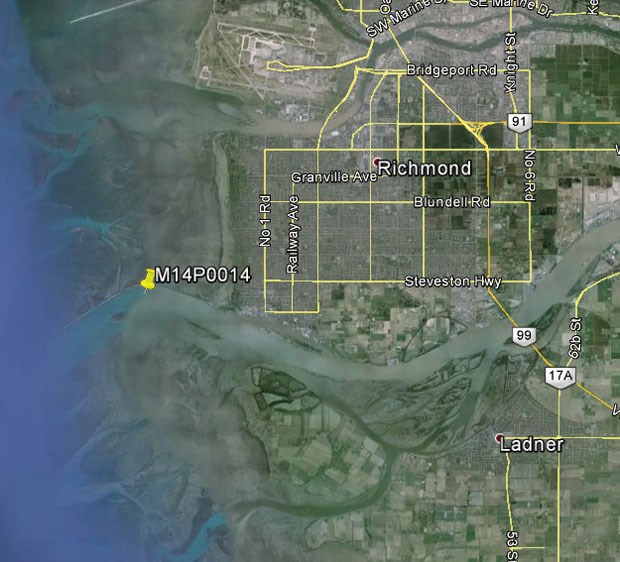The grounding near Steveston of a giant, ocean-going container vessel has called into question the safety of barging aviation fuel on the Fraser River.
The 220-metre, 38,000-ton ship ran aground during Saturday night’s thick fog at the “Steveston Bend,” just west of Garry Point.
The vessel — the German owned Cap Blanche, which is registered in Antigua and Barbuda in the West Indies — was in the correct channel and under the command of an experienced Fraser River pilot at the time it ran aground at 10 p.m.
There was no damage to the vessel or its cargo and the pilot managed to maneuver the ship out of “the mud” within 35 minutes, according to the Pacific Pilotage Authority’s CEO Kevin Obermeyer.
Obermeyer, while explaining it’s most likely the vessel hit a “sand wave,” a large ridge or hump that forms in the river’s estuary, said a “soft grounding” like this hasn’t happened in the Fraser for many years.
Although there were no repercussions from Saturday’s grounding, the incident is a “perfect example” of the concerns protest group VAPOR has been voicing for years about an VAFFC’s (airline consortium) plans to barge jet fuel on the south arm of the river.
“Despite all the assurances, all the technology, all the tugboats and experienced pilots that VAFFC say they will have; if there’s equipment and people involved, then accidents will happen,” said VAPOR’s Otto Langer, a retired federal fisheries biologist, who’s warned of catastrophic consequences for the river if a major fuel spill occurred.
“That’s exactly why there should be a precautionary approach to certain activities in certain areas and this is precisely what we’ve been talking about for years.
“This is yet another warning.”
The Transportation Safety Board (TSB) is now looking into whether to launch a full probe into the grounding.
Paulo Ekkebus, a TSB investigator, told the News that data will be collected and an assessment of the situation will be carried out before even deciding to investigate.
In an emailed statement, VAFFC’s project director, Adrian Pollard, said, with respect to his fuel delivery plan, that vessels will be in the hands of experienced river pilots and will “navigate to our terminal within the rules and guidelines set by Port Metro Vancouver.
“Our terminal will follow best practices in emergency preparedness and response, including the deployment of response vessels during all vessel movements to be able to respond quickly to any sort of incident.”
Pacific Pilotage, a government entity whose marine pilots board vessels bound for or leaving B.C.’s coastal waters, had a pilot in command during Saturday night’s incident.
“It’s important to know that the vessel was in the channel,” said Pacific Pilotage’s Obermeyer.
“He appears to have hit a ‘high spot,’ which is sand waves that form. They are ridges and humps. Pilots get updated regularly about them and they do restrict the channel somewhat.
“You’ve got these large vessels that don’t follow on rails and you do the best you possibly can; but the best wasn’t good enough this time.”
The fog was “probably a factor,” said Obermeyer, adding that, if conditions were clear, the pilot would have known exactly where he was steering, as “leading lights tell you where the dead centre of the channel is.
“On this occasion, the pilot was relying solely on electronic aids.”
The incident was “very rare in the Fraser River,” explained Obermeyer. “I’d have to go back many years for something like this to have happened and, if I recall, that incident was also in thick fog.”
Asked if the incident is likely to affect the way his pilots navigate the Fraser River in the future, Obermeyer said it would depend on the TSB’s report.
“It might be an anomaly when the vessel was maybe turning very quickly, but we might end up doing something differently,” he said.
“What we have to remember is that the channel is a three dimensional environment which keeps on changing and we’re always having to adjust to it; our pilots do a magnificent job.”
The B.C. government has already issued an environmental certificate to VAFFC’s plan, which is now awaiting a permit from Port Metro Vancouver (PMV).
PMV was asked if Saturday’s grounding would figure in its permit decision, but it didn’t respond by press time.



